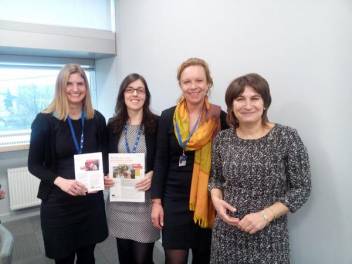 Representatives from HelpAge International’s EU network attended a high level event on Women’s Economic Empowerment and Sustainable Development in Riga on Monday 2 March, just days before International Women’s Day is celebrated on 8 March.
Representatives from HelpAge International’s EU network attended a high level event on Women’s Economic Empowerment and Sustainable Development in Riga on Monday 2 March, just days before International Women’s Day is celebrated on 8 March.
World Granny from the Netherlands, Age Action Ireland and the HelpAge International EU office attended in order to highlight how ageing is a gender issue, and what can be done to improve older women’s economic situation.
As well as the European Year for Development, the event took place in the context of the post-2015 framework, the twenty year anniversary of the Beijing Platform for Action and the launch of the process to develop the EU’s Gender Action Plan for its external action, due to be adopted later this year.
Older women and the importance of data
There was a noted absence of ageing and older women in the opening statements and different panel discussions at the event. Given that women form the majority of the world’s older people – women over 50 account for almost one quarter of the world’s women – it is shocking the lack of attention they get. We were however pleased that the closing panel of the day did finally make reference to older women.
Baroness Northover, Parliamentary Under Secretary of State for International Cooperation in the UK spoke about the discriminatory practice of widows losing their inheritance and both Martin Bille Hermann, State Secretary for Development of Denmark and Andris Piebalgs, former European Commissioner for Development highlighted the importance of collecting disaggregated data by age and gender.
Data disaggregated by age is of huge importance in order to provide an accurate picture of older people and their needs. The Beijing Platform for Action emphasised the need for age-disaggregated data. Twenty years on, however, overall availability of sex and age disaggregated data over the age of 65 remains weak in the national implementation reports coming out of its review this year.
This must be followed up in the implementation of Beijing and at the Commission on the Status of Women next week. The post-2015 framework must also ensure the collection and dissemination of data disaggregated by age and sex without upper age limits across all goals and targets.
Economic empowerment of older women
We had a very useful meeting with Minister for Foreign Trade and Development Cooperation in the Netherlands, Lilianne Ploumen. We talked about the contribution older women can bring to entrepreneurship in terms of their experience and local knowledge. We also discussed the financial exclusion of older women in accessing credit and their reliance on the informal sector for employment.
Minister Ploumen and her advisers committed to analysing the Dutch gender-focused employment and entrepreneurial programmes to see how older women could be included.
They were also very interested in framing older women’s issues in the life course approach. The life course approach looks at women and girls over the course of their lives and is helpful in highlighting how a life time of discrimination accumulates for women in old age. Older women often experience multiple discrimination on the grounds of gender, age and marital status.
We also met with Parliamentary State Secretary for EU Affairs of Latvia, Zanda Kalniņa -Lukaševica. This was particularly useful as Latvia, as current EU presidency holders, are one of the drivers of the EU Gender Action Plan. We again discussed the position of older women and emphasised the importance of the inclusion of data disaggregated by age in the Plan.
Call for action
Our network took the opportunity to attend this high level event to disseminate our European Year for Development 2015 Call for Action.
As well as health, humanitarian aid and demography, the action also focuses on women and girls so it was fitting to be able to distribute this to delegates.
We will be working together over the coming months to influence the new EU Gender Action Plan and ensure that older women are not forgotten.
Download our call for action and find out more about our European network.
